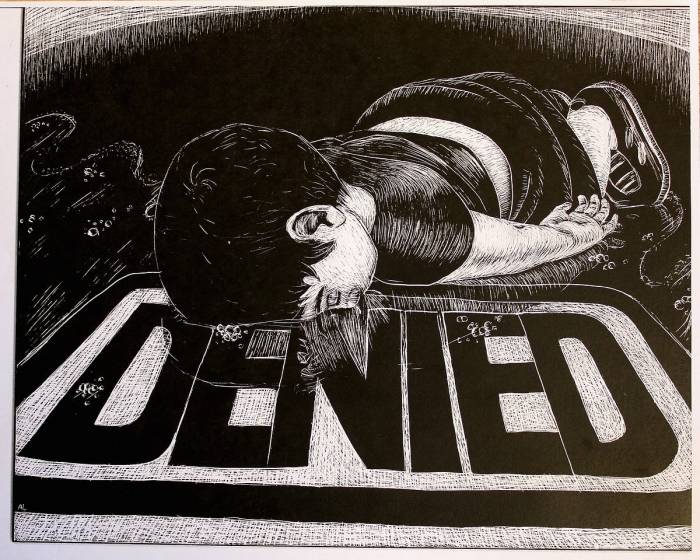Reflections on exile by edward said – Edward Said’s reflections on exile have profoundly shaped our understanding of the complexities and consequences of displacement. His personal experiences, coupled with his incisive analysis, provide a unique lens through which to examine the psychological, political, and social implications of exile.
Said’s writings on exile offer a nuanced exploration of the challenges faced by those who are forced to leave their homelands, shedding light on the complexities of identity, belonging, and loss.
Historical Context of Exile
Exile, the forced removal of individuals or groups from their homelands, has been a prevalent phenomenon throughout history. Its roots can be traced back to ancient times, when rulers and leaders used banishment as a means of punishment, political control, and religious persecution.
Reasons for exile have varied across different eras and cultures. In ancient Greece and Rome, exile was often employed to remove political opponents or those deemed a threat to the state. During the Middle Ages, religious conflicts and inquisitions led to the exile of individuals who held dissenting beliefs.
Famous Individuals Exiled
History is replete with examples of famous individuals who have faced exile. Some notable examples include:
- Ovid, the Roman poet, was exiled to the Black Sea region for his alleged involvement in a scandal.
- Dante Alighieri, the Italian poet, was exiled from Florence for his political beliefs.
- Napoleon Bonaparte, the French emperor, was exiled to the island of Elba and later to Saint Helena.
- Vladimir Lenin, the Russian revolutionary, was exiled to Siberia before returning to lead the Bolshevik Revolution.
- Leon Trotsky, the Soviet revolutionary, was exiled from the Soviet Union by Joseph Stalin.
Edward Said’s Personal Experience of Exile

Edward Said’s personal experiences of exile profoundly shaped his perspective on the world and his sense of identity. Born in Jerusalem in 1935, Said was forced to leave his homeland in 1948 when his family was displaced during the Arab-Israeli conflict.
This experience of forced displacement left an indelible mark on Said, fostering within him a deep understanding of the complexities of exile and its impact on individuals and communities. It also instilled in him a sense of solidarity with other displaced peoples and a lifelong commitment to advocating for their rights.
Impact on Perspective, Reflections on exile by edward said
Said’s exile led him to develop a critical perspective on the power dynamics that shape global politics and the ways in which marginalized voices are often silenced or ignored. He argued that exile creates a unique vantage point from which to observe and analyze the world, allowing individuals to see beyond the dominant narratives and ideologies that often perpetuate oppression.
Identity and Belonging
The experience of exile also had a profound impact on Said’s identity and sense of belonging. He felt a deep sense of loss and displacement, and he struggled to reconcile his multiple identities as a Palestinian, an American, and an intellectual.
Through his writing and activism, Said sought to explore and articulate the complex experiences of exile and to create a space where displaced people could feel a sense of community and belonging.
The Psychological and Emotional Impact of Exile: Reflections On Exile By Edward Said
Exile profoundly affects individuals’ psychological and emotional well-being, often leading to complex and enduring challenges. Exiles face a myriad of stressors, including the loss of home, social networks, and cultural identity, which can have severe consequences for their mental health.
One of the most significant psychological challenges faced by exiles is the concept of “double consciousness.” This term, coined by W.E.B. Du Bois, describes the experience of living in two worlds simultaneously, often with conflicting values and expectations. Exiles may feel a sense of displacement and alienation from both their homeland and their adopted country, leading to feelings of isolation and marginality.
Themes of Loss, Displacement, and Alienation
Edward Said’s writings on exile extensively explore the themes of loss, displacement, and alienation. In his seminal work, “Orientalism,” he argues that the West has constructed a distorted and exoticized image of the East, which has led to the alienation and marginalization of Eastern cultures.
Said’s personal experience of exile from Palestine shaped his understanding of these themes, and his writings offer a poignant and insightful examination of the psychological and emotional impact of exile.
The Political and Social Implications of Exile

Exile, the forced removal of individuals or communities from their homeland, has profound political and social consequences. It can lead to the loss of citizenship, property, and social status, as well as the disruption of families and communities.
Political Consequences
Exile can have a significant impact on political systems. It can be used as a tool of political repression, as governments seek to silence or remove dissidents and political opponents. Exile can also lead to the formation of political movements, as exiled individuals and communities seek to return to their homeland and regain their political rights.
Social Consequences
Exile can have a devastating impact on individuals and communities. It can lead to the loss of social networks, cultural identity, and economic opportunities. Exiled individuals may face discrimination and prejudice in their new homes, and they may struggle to rebuild their lives.
Empowerment and Disempowerment
Exile can both empower and disempower individuals. On the one hand, it can provide them with the opportunity to escape persecution and to start a new life in a new country. On the other hand, exile can also lead to a sense of loss and alienation, and it can make it difficult for individuals to participate fully in their new societies.
The Literary and Artistic Expressions of Exile
Exile has been a profound source of inspiration for literary and artistic works throughout history. These works provide a unique lens through which to understand the experiences and emotions of those who have been forced to leave their homes.
Literary Works
Literature has long been a powerful medium for expressing the complexities of exile. Exiled writers often use their work to explore themes of loss, longing, and identity. Some notable examples include:
- The Odysseyby Homer: This epic poem tells the story of Odysseus, a Greek hero who spends 10 years wandering the Mediterranean after the Trojan War.
- The Divine Comedyby Dante Alighieri: This allegorical poem follows the journey of Dante through Hell, Purgatory, and Paradise. Dante was exiled from Florence in 1302.
- The Book of Sandby Jorge Luis Borges: This collection of short stories explores the themes of exile, memory, and time. Borges was exiled from Argentina in 1946.
Artistic Works
Art has also played a vital role in giving voice to the exiled experience. Visual artists often use their work to depict the pain and suffering of those who have been forced to flee their homes. Some notable examples include:
- Guernicaby Pablo Picasso: This painting depicts the bombing of the Basque town of Guernica during the Spanish Civil War. Picasso was exiled from Spain in 1939.
- The Raft of the Medusaby Théodore Géricault: This painting depicts the survivors of a shipwreck who are stranded on a raft in the Atlantic Ocean. Géricault was exiled from France in 1816.
- The Migrant Motherby Dorothea Lange: This photograph depicts a migrant mother and her children during the Great Depression. Lange was inspired to take the photograph after meeting the family in a migrant camp in California.
Role of Art
Art plays a crucial role in giving voice to the exiled experience. It provides a platform for exiles to share their stories and to connect with others who have experienced similar hardships. Art can also raise awareness of the plight of exiles and advocate for their rights.
The Legacy and Impact of Edward Said’s Work on Exile

Edward Said’s seminal work on exile has profoundly shaped our understanding of this complex and multifaceted experience. His groundbreaking contributions have not only illuminated the plight of exiles but have also challenged traditional notions of home, belonging, and identity.Said’s work has had a profound impact on contemporary understandings of exile and displacement.
He argued that exile is not simply a physical separation from one’s homeland but also a psychological and emotional rupture that can have lasting consequences for individuals and communities. His insights have helped to destigmatize the experience of exile and have fostered a greater understanding of the challenges faced by those who are forced to leave their homes.
Influence on Other Scholars and Activists
Said’s ideas have significantly influenced other scholars and activists working on issues of exile and displacement. His work has inspired numerous academic studies on the topic, as well as the development of new methodologies for understanding and addressing the needs of exiled populations.
Moreover, Said’s writings have played a pivotal role in shaping the work of human rights organizations and advocacy groups dedicated to supporting refugees and asylum seekers.
FAQ Resource
What is the significance of Edward Said’s work on exile?
Edward Said’s work on exile has been groundbreaking in its exploration of the psychological, political, and social implications of displacement. His writings have influenced our understanding of identity, belonging, and the role of art in giving voice to the exiled experience.
How did Said’s personal experiences shape his views on exile?
Said’s own experiences as a Palestinian exile deeply influenced his perspectives on exile. He drew upon his personal insights to illuminate the complexities of displacement and the challenges faced by those who are forced to leave their homelands.